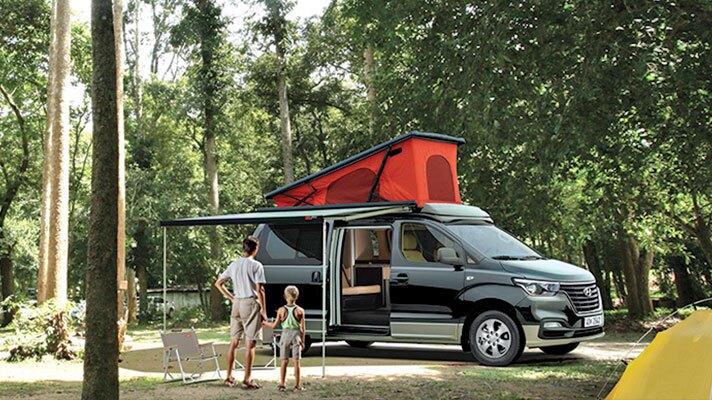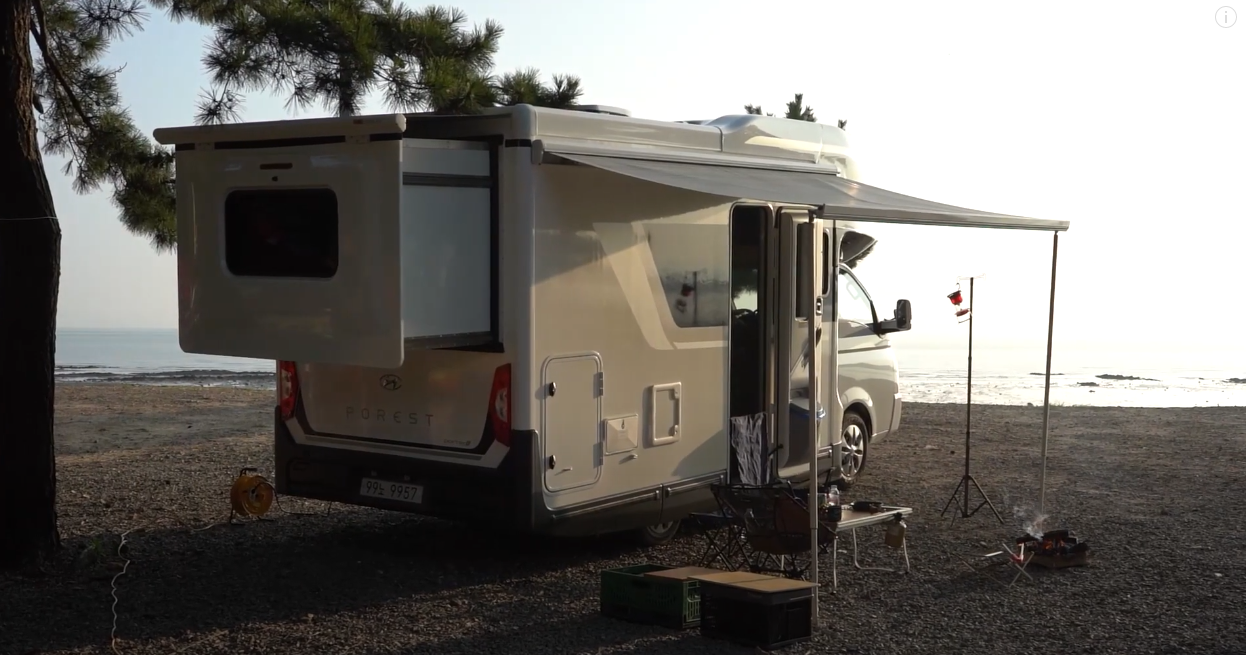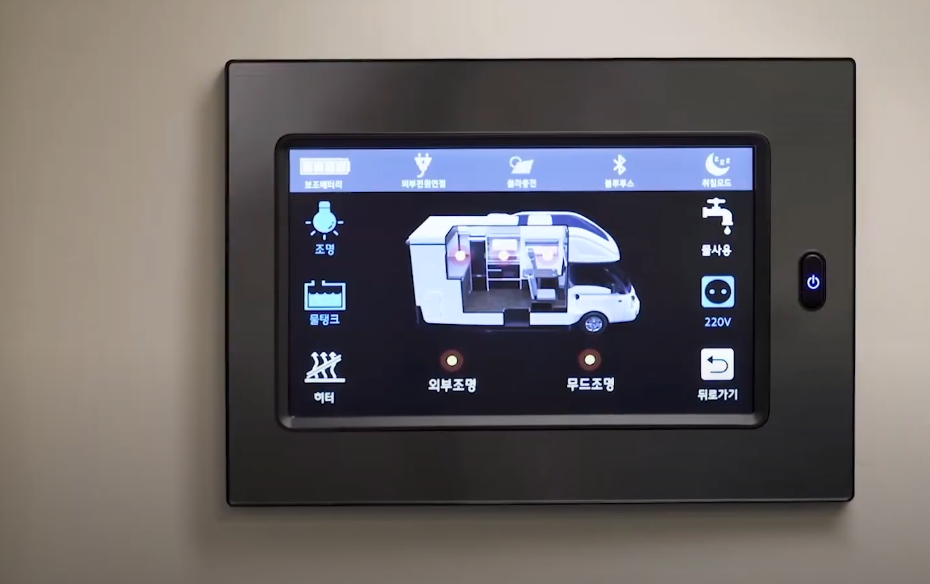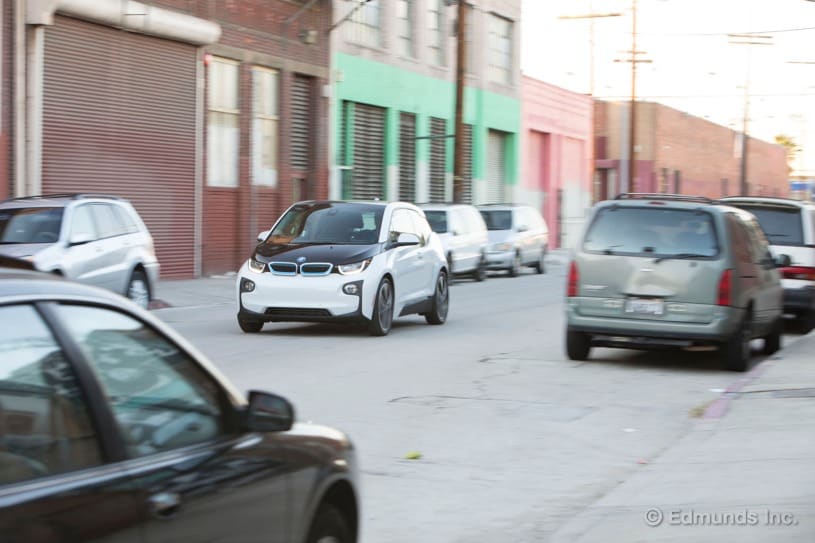Hyundai goes camping with expanding mini-motorhome
Hyundai’s badge does appear on the occasional camper van, but it is far from the first automotive brand one might associate with campers. The Korean automaker does in fact offer a small motorhome lineup of its own, though, designed around the needs of the growing RV market in its home country. The Porest is the latest addition to the Hyundai camper car family, looking something like a mono-shelled electric shuttle bus of the future while offering an expanding home-on-the-road with three beds, a bathroom, a kitchen and smart home-style control.
With the COVID-19 pandemic limiting other forms of travel and recreation, the already-popular activity of camping has experienced accelerated growth in South Korea, much like it has in the Western world. Even before the pandemic, Korean camping enthusiasts were pushing beyond tent and towable camping, increasingly shopping for motorized campers, often referred to in the country as “camping cars,” much like in Japan. Last year, Hyundai noted that camping car registrations exploded from a mere 346 in 2007 to 9,231 by 2018.
Earlier in 2020, Korea’s Ministry of Land, Infrastructure, and Transport loosened restrictions around converting vehicles into campers, a move expected to grow RV popularity even more.

Hyundai
So why would Korea’s largest automaker sit idly by and watch other foreign and domestic brands gobble all that action up? Hyundai already has its hands in the market with the Grand Starex camper van, launched in 2013 (new-2018+ version pictured above), and this year it adds the Porest compact motorhome for consumers looking for more space at vehicular base camp.
That name. “Porest” doesn’t exactly present favorably when spoken in English, but in this case, it’s a portmanteau of “Porter” and “rest,” the Porter II truck being the base vehicle of the design. So it has nothing to do with a poor man’s budget RV.

Hyundai
The Porest’s build very much reflects the two parts combined into one of its name, smashing together the narrow, compact cab of the Porter II with a tall, wide, low-hanging motorhome module built for rest and relaxation. Despite the drastically opposed proportions of cab and camper, Hyundai manages to smoothen the design into something that looks no worse than the average American or European Class C motorhome, better if you ask us. On the downside, that sagging lower body does appear like it will scrape loudly on anything larger than the tiny bits of rock covering the campground’s gravel driveway.
Walk through the passenger-side motorhome door, and the Porest impresses with how much it carries inside a small space. Up front, the two rear passenger seats transform into sidewall benches around a dining table. A curtain closes the living area off from the driver cab.

Hyundai
It’s not surprising to learn that the dining table drops down to create a couch/bed out of the dinette. What is more surprising is that the ceiling overhead drops down at the push of a button, stopping in line with the alcove to adjoin two half-mattresses into an upper bunk. It looks like the lower bed is rendered suitable mostly for children, but that’s probably just fine for the young camping families to whom the Porest promises to appeal.
And if that front bed layout isn’t fine, the Porest has one more hidden slide feature that can help. Quite like Westfalia’s new James Cook, the Porest slide-out extends out the upper rear-end of the body. The little box slides 31 in (800 mm) to expand the rear bedroom into a comfortable mattress-filled space for two. The space below this rear bed is occupied by a full-width cargo garage.

Hyundai
Beyond sleeping people on three different beds, the Porest does everything else a motorhome should do. Behind the dinette on the driver’s side is a tall, thin kitchen block that houses the usual sink, worktop and standing-height fridge. A difference here is that instead of a stove, a microwave stands in for indoor cooking. Our first thought is that we’d rather see a traditional stove, but Porest dwellers can always cook outside with a portable stove or grill, so no big loss (unless the weather is terrible and the optional awning stuck).
The optional compact wet bathroom houses the usual shower, sink with foldaway basin, toilet and mirror. From what we’ve read about Korean campsites, restrooms are usually readily available, so that might be why the bathroom is optional, not standard.

Hyundai
Hyundai also equips the Porest with a command touchscreen, and while it doesn’t sound quite as comprehensive as Mercedes MBAC-based systems, it offers direct lighting and heating control and water and battery monitoring. The system also includes an app for mobile monitoring and control. Air conditioning and television are available to create an even comfier home-like atmosphere.
Hyundai introduced the Porest in July, and a report at the time from English-language newspaper The Korea Herald stated price would start at KRW64.3 million (approx. US$56,150) for the four-passenger version and KRW48.9 million ($42,700) for a two-person variant.
Hyundai has not yet added the motorhome to its Porter special vehicles price list. The Grand Starex pop-up camper van mentioned earlier is listed on the Grand Starex special vehicles page at a starting price around KRW50.1 million ($43,750).
We know many an American RVer would love something like the Porest (they’ve made that clear on Hyundai’s Porest social media promotions), but unfortunately the motorhome is very much a Korea-centric design. Hyundai doesn’t even sell the Porter (H100) in North America.
The minute-long video below gives a quick but thorough look at the Porest and its various features.
For Priceless Getaways | Hyundai POREST
Source: Hyundai








